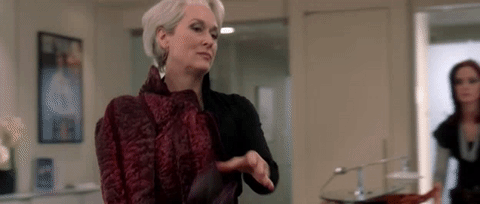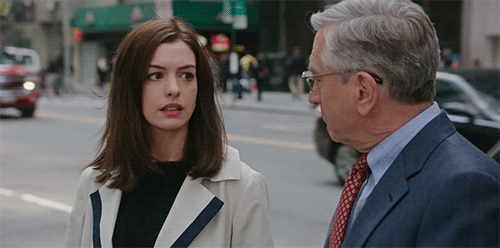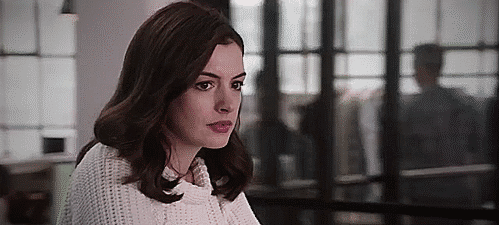A recurring nightmare of my life is Miranda Priestly dumping her high-end handbags and ostentatious overcoats on my desk, missing my nose by inches, as she barks orders for the day. Yes, not priestly at all.

The Devil Wears Prada, which released on this day 15 years ago, often comes haunting (wrapped in all its hot couture) with questions like: "Do I see myself doing this for the rest of my life?"; "Have I sold my soul?"; and "Am I a few missteps away from getting fired?" But then it also serves as a reminder that I can walk away from all these fears whenever I choose to, like Andrea (Anne Hathaway) did in the David Frankel film. Rather than chanting to myself and others, "I have no choice," "I love my job," or "The devil made me do it," I can hang up my heels so to speak and boot the drill away.

I could relate to the nervous energy of Andrea when she walks into the Runaway office for a job interview, like sneaking into a jungle for an adventure. She does not realise how seriously the fashion fraternity takes itself — "Clothing is not for utility, it is an instrument of individual expression." Years into entertainment and culture writing, I now hear myself defending my areas of vocation in as many words.
When Andrea greets Miranda (Meryl Streep) for the first time, the black-cloaked boss asks in listless fashion: "Who are you?" In that moment, Andrea knows she will have to prove her identity every day of her job. Miranda keeps addressing her as Emily (Emily Blunt's character, whose Andrea replaces) for days. And when she addresses her as Andy one day, Andy realises she has done something right.
Though I have not taken head-on the vicious verbal assaults that Miranda showers on Emily — "Details of your incompetence do not interest me," "Bore someone else with your questions," or "Is there a reason my coffee isn't here? Has she died or something?" — I must admit chief editors of renowned publications are rather quick with their brutally eloquent remarks. I cannot say this happened to me, but an editor once asked a fairly new subordinate to "wallow in the filth that is your writing."
What I could certainly relate to was when Miranda orders Andrea on a do-or-die mission to source the manuscript of the next Harry Potter book (isn't that the world's best kept secret?) within four hours. I have not been thrown into the deep end with the same Herculean force but I confess I have sneaked into sealed AGMs and reported on their confidential plans to oppose government orders, and smuggled a photographer (not just the camera, but the photographer) into a factory for evidence to prove their non-compliance of safety requirements.
But like Andy, I realised in the end that I would not give an arm or leg for a job or mentor that drains me spiritually and emotionally, besides physically and mentally. When Andy comes to terms with the fact that she has set out on the path that her mentor carved — a path that demands she treat people she looks up to, merely as stepping stones — she decides it is best to walk away. The last straw is Miranda telling her, "I see myself in you." Andy resigns in the next instant, and applies for a job at another publication, surprised that her prospective editor has received a good recommendation from Miranda.

In the final, most telling scene of The Devil Wears Prada, Andy waves from across the street at Miranda as a gesture of gratitude, but she chooses to ignore it. As Miranda sits in her car, watching Andy walk away in the opposite direction, she smiles with delight at having made possible a life she could have lived had she chosen to walk away. She realises it is too late for her to surrender the perception she has built for herself, but does not want a promising girl like Andy to waste her potential on a life she has to sacrifice a great deal for.
It is in that moment The Devil Wears Prada ceases to be merely a lesson in embracing abandon as a newbie but evolves to become a masterclass in mentorship. A good mentor should push her protégé, but should also let her go and wish her well on realising she is not made for the drill.
A spiritual sequel to this film, Nancy Meyers' The Intern (2015) upturns the mentor-protégé relationship. Ben Whittaker (Robert DeNiro) a retired 70-year-old man, volunteers to intern with e-commerce fashion startup About The Fit, founded by Jules Ostin (Anne Hathaway). Jules is no Miranda Priestly; she is the quintessential millennial entrepreneur who cycles across the office and texts like a machine gun. Her workspace is also more casual, devoid of scalar chains and formal attire.
It is interesting to see Hathaway as the boss here. Jules is what Andy could have become had she chosen to continue her reckless streak at work. A similar epiphany strikes Jules as she realises she is wasting her precious young years and not working enough on her marriage and family. But Ben, having spent a full life, makes his boss realise that she needs to be in control of the company she has built from scratch. Unlike Miranda, who gets divorced from her husband and decides to live vicariously through a more young and rebellious Andy, Jules has several decades ahead of her. But Ben ensures she does not become a victim to the working woman's guilt.
The lesson embedded here is to strike a balance between work and personal lives, rather than forsaking one for the other. But the more crucial lesson is to learn from one's protégé. While Ben was far more experienced than Jules, as a young mentor, I have had the most fruitful learnings from my younger colleagues when I have chosen to be receptive. They often remind me of the dire need to take a breather when I am overworking, but also come up with the best pep talks right when I need them the most.

Another New York workplace drama, The Bold Type, streaming on Netflix in India, has given me another onscreen mentor to look up to. Jacqueline Carlyle (Melora Hardin), the editor-in-chief of Scarlet, a women's and fashion magazine, is a former war reporter, now covering millennial sex lives, sustainable fashion, and #MeToo. The transition and range of her area of reportage itself suggests that she is a professional who operates above judgment.
Her gaze towards her subordinates is as non-judgmental. She is no Miranda Priestly who pushes her colleagues towards unattainable perfection, but only nudges them in the right direction whenever they screech to a halt. There is a glass wall between her colleagues and herself, but she often walks through it to give a reassuring nudge or a pat on the back. It breaks your heart when she tells Jane that she cannot rehire her after Jane chose to quit for an unsuccessful switch weeks ago. "You need to live this failure," is the rudest nudge Jacqueline gives across the four seasons of the show, but Jane's arc shows that it only makes her a more seasoned professional.

All these mentors — Miranda Priestly, Jules Ostin, and Jacqueline Carlyle — pay the price of being women. They battle strained relationships with partners at home and corporate politics that threaten to replace them as the heads of the empires they have built over years. On days when I feel I am struggling with striking the right balance, their stories reassure me that despite my diligence and vision, I will always be a work-in-progress.
At a time when I have lost my mentor to COVID-19, and have an increasing void in that space due to recent developments, I am glad I have three reel mentors to turn to in my living room. They may not be interested in "the details of my incompetence," but their journeys definitely make me feel heard.

from Firstpost Bollywood Latest News https://ift.tt/3wfOpAd



0 Comments